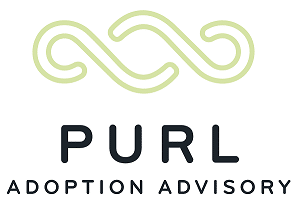This guest blog post includes Five Recommendations for Parents to Seek Out For Their Child with a History of Adoption or Foster Care. It was written by Kimara Gustafson MD, MPH, Erin Bocock, and Judith Eckerle MD with Adoption Medicine Clinic. This blog post will discuss different assessments and care that is available for a child who was adopted and/or a child who may have a background of abuse/neglect, stress, early adversity and prenatal exposures.
—-
Ask any new parent if they can remember their first night of being an expanded family and I guarantee that you’ll likely get a good laugh- they may ask you how much time you have. All the emotions coming together as the journey to parenthood feels like it’s finally become a reality. The path to becoming that new family is definitely not an easy one and oftentimes can take years, but many parents will tell you that once a new child finally joins the family, that is when the real journey begins. Whether they are a newborn, a school age child, or a teenager, there is always going to be a part of their life story that occurred before you all became a family. And this part will likely continue to have an ongoing impact on who they grow up and develop to become. Commonly we hear from parents, “Is this normal X year old behavior or is this related to their history of trauma, substance exposure, adoption, etc.?” Or we hear “what are some things I should be on the look-out for as they grow, given their early life history?” And most commonly “Do we need to see adoption specialists for our child? Even if we don’t have any concerns?”
These are all great questions, and we always start off by saying that just the fact that you’re asking questions is a sign that you’re on the right track in terms of parenting. For all of these questions and to best address these concerns, we recommend that your child be seen for a comprehensive post-adoption or foster care assessment. By comprehensive, we recommend that each child has a baseline evaluation by a medical provider familiar with kids who have adoption or foster care histories, a mental health professional, dental provider, and child developmental specialist. We are fortunate that at the Adoption Medicine Clinic (AMC) at the University of Minnesota we are able to offer all these providers in a streamlined manner through our Comprehensive Child Wellness Assessment (CCWA) for any child who has been adopted or is in foster care. There may be an adoption clinic in your area who could help you find adoption/foster care specialists in these areas if there isn’t a comprehensive program close to you, or we routinely have parents travel to the Minnesota Twin Cities for a comprehensive evaluation. Here are five recommendations for parents to seek out for their child with a history of adoption or foster care:
1. Medical Assessment:
Consistent prenatal or medical care may not have been provided to your child prior to being a part of your family. It is important to have your child assessed head to toe by a medical professional who has experience working with children who have backgrounds of abuse/neglect, stress, early adversity and prenatal exposures. A comprehensive assessment can optimize your child’s physical health and nutrition, as well as prevent any future health problems. An adoption competent medical professional can help you understand how your child’s history of adoption might play into their behaviors, development, and physical health. Parenting a child with a history of early adversity can be different in terms of guidelines and recommendations. They can also order lab tests to diagnose underlying medical conditions, and provide tips such as how to clean up your child’s sleep hygiene. The provider will be able to create a roadmap for next steps such as referrals to neuropsychology, endocrine, genetics, audiology, ophthalmology, etc., or work with your school to get assessments for school support as needed.
2. Mental Health Assessment:
It is possible your child experienced toxic stress in utero or prior to becoming a part of your family. This stress can affect the way your child’s brain reacts to their environment, resulting in physical and emotional issues as your child ages. It can also impact how your child attaches and bonds with you. Early intervention and caregiver support is key and the earlier it is recognized, the better for the child and for the family. Watch for warning signs in your child such as difficulty regulating emotions, not seeking out a parent/guardian to express needs, persistent trouble falling asleep, or difficulty building healthy relationships with peers. We recommend that all children with a history of foster care or adoption have a needs assessment with an adoption competent mental health professional, but especially if you are seeing any early signs of dysregulation. Remember, it is okay for you as the parent and family to seek out mental health if you are feeling overwhelmed or if you need guidance or support. Putting on your own “oxygen mask” first, means you will be better able to support your child.
3. Developmental Assessment:
Risk factors that can be present in kids with a history of adoption or foster care can affect your child’s speech, learning, sensory processing, coordination, and strength. This can play into everyday activities like tying shoes, writing, ability to self-regulate, eating, and sleeping. A developmental screening that takes in account early life stress, can be completed by a medical provider, occupational therapist, or physical therapist to help you understand areas in which your child’s development shines, and areas where it needs extra support. Referrals to speech therapy, occupational therapy, and physical therapy can help with your child’s developmental needs.
4. Prenatal Substance Exposure Assessment:
The children that we work with from adoption and foster care are at a greater risk for prenatal drug and alcohol exposures. Whether the exposure is known or if there is a suspicion, a screening for Fetal Alcohol Spectrum Disorder (FASD) is recommended. A medical provider trained in screening for FASD can do an initial evaluation and recommend further testing, if needed. The earlier the diagnosis, the earlier your child can have the correct resources to help them succeed.
5. Dental Assessment:
Research has shown that children who have a history of adoption or foster care are at higher risk for delayed dental exams and may have poorer dentition and more dental and health problems related to unaddressed dental needs. A pediatric dental provider is able to gather background information to help guide any further recommendations regarding establishing optimal dental health and care, as well as partner with other specialists (such as occupational therapy, mental health providers or speech therapy) as needed if there are other concurrent issues that are negatively impacting dental health (such as teeth grinding from high anxiety, or struggles with teeth brushing due to sensory input dysregulation).
Frequently, your child’s physical, developmental, and mental health influence one another. In order to optimize a child’s attachment and emotional wellbeing, it is important to rule out issues from multiple angles so that your child can reach their full potential. It is important to find a team of professionals that will work together in order to provide the best care for your child. If you are in the Midwest, or open to travel, consider making an appointment at the AMC for a comprehensive child wellness assessment.
For more information about the Adoption Medicine Clinic click here or call (612) 624-116.
Other resources:
National Organization on Fetal Alcohol Syndrome
Proof Alliance (MOFAS- The Minnesota Organization on Fetal Alcohol Syndrome)
This guest blog post includes Five Recommendations for Parents to Seek Out For Their Child with a History of Adoption or Foster Care. It was written by Kimara Gustafson MD, MPH, Erin Bocock, and Judith Eckerle MD with Adoption Medicine Clinic. This blog post will discuss different assessments and care that is available for a child who was adopted and/or a child who may have a background of abuse/neglect, stress, early adversity and prenatal exposures.
—-
Ask any new parent if they can remember their first night of being an expanded family and I guarantee that you’ll likely get a good laugh- they may ask you how much time you have. All the emotions coming together as the journey to parenthood feels like it’s finally become a reality. The path to becoming that new family is definitely not an easy one and oftentimes can take years, but many parents will tell you that once a new child finally joins the family, that is when the real journey begins. Whether they are a newborn, a school age child, or a teenager, there is always going to be a part of their life story that occurred before you all became a family. And this part will likely continue to have an ongoing impact on who they grow up and develop to become. Commonly we hear from parents, “Is this normal X year old behavior or is this related to their history of trauma, substance exposure, adoption, etc.?” Or we hear “what are some things I should be on the look-out for as they grow, given their early life history?” And most commonly “Do we need to see adoption specialists for our child? Even if we don’t have any concerns?”
These are all great questions, and we always start off by saying that just the fact that you’re asking questions is a sign that you’re on the right track in terms of parenting. For all of these questions and to best address these concerns, we recommend that your child be seen for a comprehensive post-adoption or foster care assessment. By comprehensive, we recommend that each child has a baseline evaluation by a medical provider familiar with kids who have adoption or foster care histories, a mental health professional, dental provider, and child developmental specialist. We are fortunate that at the Adoption Medicine Clinic (AMC) at the University of Minnesota we are able to offer all these providers in a streamlined manner through our Comprehensive Child Wellness Assessment (CCWA) for any child who has been adopted or is in foster care. There may be an adoption clinic in your area who could help you find adoption/foster care specialists in these areas if there isn’t a comprehensive program close to you, or we routinely have parents travel to the Minnesota Twin Cities for a comprehensive evaluation. Here are five recommendations for parents to seek out for their child with a history of adoption or foster care:
1. Medical Assessment:
Consistent prenatal or medical care may not have been provided to your child prior to being a part of your family. It is important to have your child assessed head to toe by a medical professional who has experience working with children who have backgrounds of abuse/neglect, stress, early adversity and prenatal exposures. A comprehensive assessment can optimize your child’s physical health and nutrition, as well as prevent any future health problems. An adoption competent medical professional can help you understand how your child’s history of adoption might play into their behaviors, development, and physical health. Parenting a child with a history of early adversity can be different in terms of guidelines and recommendations. They can also order lab tests to diagnose underlying medical conditions, and provide tips such as how to clean up your child’s sleep hygiene. The provider will be able to create a roadmap for next steps such as referrals to neuropsychology, endocrine, genetics, audiology, ophthalmology, etc., or work with your school to get assessments for school support as needed.
2. Mental Health Assessment:
It is possible your child experienced toxic stress in utero or prior to becoming a part of your family. This stress can affect the way your child’s brain reacts to their environment, resulting in physical and emotional issues as your child ages. It can also impact how your child attaches and bonds with you. Early intervention and caregiver support is key and the earlier it is recognized, the better for the child and for the family. Watch for warning signs in your child such as difficulty regulating emotions, not seeking out a parent/guardian to express needs, persistent trouble falling asleep, or difficulty building healthy relationships with peers. We recommend that all children with a history of foster care or adoption have a needs assessment with an adoption competent mental health professional, but especially if you are seeing any early signs of dysregulation. Remember, it is okay for you as the parent and family to seek out mental health if you are feeling overwhelmed or if you need guidance or support. Putting on your own “oxygen mask” first, means you will be better able to support your child.
3. Developmental Assessment:
Risk factors that can be present in kids with a history of adoption or foster care can affect your child’s speech, learning, sensory processing, coordination, and strength. This can play into everyday activities like tying shoes, writing, ability to self-regulate, eating, and sleeping. A developmental screening that takes in account early life stress, can be completed by a medical provider, occupational therapist, or physical therapist to help you understand areas in which your child’s development shines, and areas where it needs extra support. Referrals to speech therapy, occupational therapy, and physical therapy can help with your child’s developmental needs.
4. Prenatal Substance Exposure Assessment:
The children that we work with from adoption and foster care are at a greater risk for prenatal drug and alcohol exposures. Whether the exposure is known or if there is a suspicion, a screening for Fetal Alcohol Spectrum Disorder (FASD) is recommended. A medical provider trained in screening for FASD can do an initial evaluation and recommend further testing, if needed. The earlier the diagnosis, the earlier your child can have the correct resources to help them succeed.
5. Dental Assessment:
Research has shown that children who have a history of adoption or foster care are at higher risk for delayed dental exams and may have poorer dentition and more dental and health problems related to unaddressed dental needs. A pediatric dental provider is able to gather background information to help guide any further recommendations regarding establishing optimal dental health and care, as well as partner with other specialists (such as occupational therapy, mental health providers or speech therapy) as needed if there are other concurrent issues that are negatively impacting dental health (such as teeth grinding from high anxiety, or struggles with teeth brushing due to sensory input dysregulation).
Frequently, your child’s physical, developmental, and mental health influence one another. In order to optimize a child’s attachment and emotional wellbeing, it is important to rule out issues from multiple angles so that your child can reach their full potential. It is important to find a team of professionals that will work together in order to provide the best care for your child. If you are in the Midwest, or open to travel, consider making an appointment at the AMC for a comprehensive child wellness assessment.
For more information about the Adoption Medicine Clinic click here or call (612) 624-116.
Other resources:
National Organization on Fetal Alcohol Syndrome
Proof Alliance (MOFAS- The Minnesota Organization on Fetal Alcohol Syndrome)




